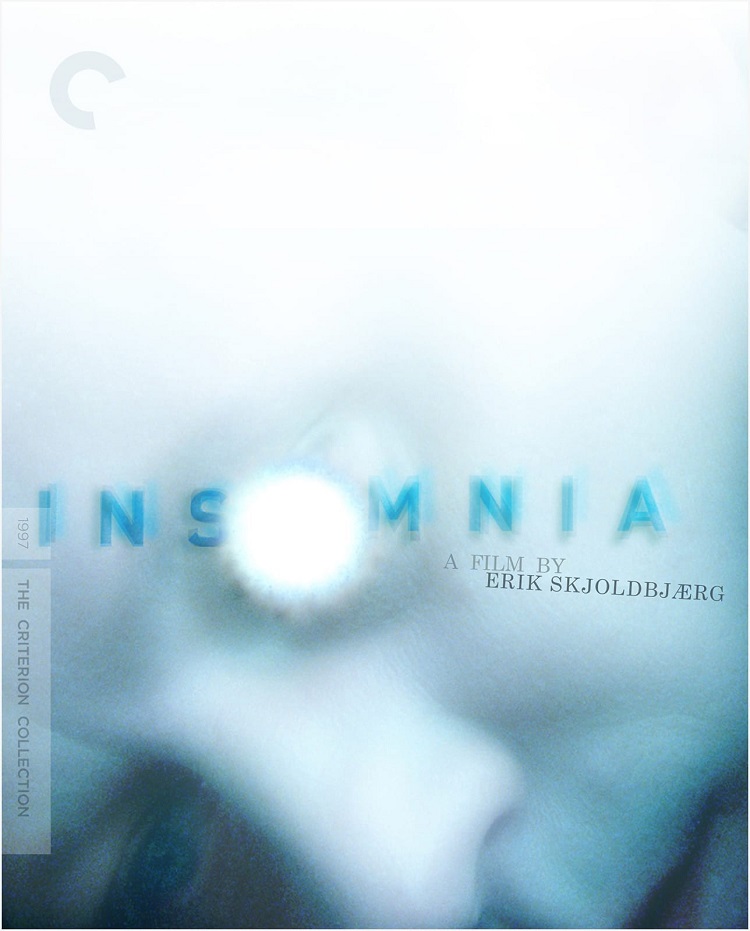
I sat down to write this upon the day of hearing of the passing of Robin Williams. He took a big chance in a serious role in the Christopher Nolan 2002 remake of this 1997 Norwegian film. Nolan’s follow-up to Memento was a dark tale of madness. The movie poster shows the dark silhouetted faces of Al Pacino and Robin Williams. That is all you need to know about the differences between these films. Insomnia as directed by Erik Skjoldbjaerg is unblinkingly bright. So much so that it hurts.
There was never a doubt in my mind it would be a part of The Criterion Collection and as the spine number of 47 indicates, it has been for quite a while. Insomnia stars Stellan Skarsgard (who we now recognize from the Thor and Avengers films) a Swede, Jonas, working as a detective in Norway. He’s is partnered with Erik, a Norweigian. I’m reminded of other detectives from this area of the world that have inspired American remakes including The Girl With the Dragon Tattoo and the original versions of the television series The Killing and The Bridge. All of these share one thing in common – investigators with a questionable or troubled past. And in many cases they have a history of mental illness.
The movie takes place 200 miles north of the Arctic Circle. The murder takes place quickly before the titles even run in a roughly shot murder sequence. And then we cut to the beginning of the investigation. It has a very current TV show feel to that scene but that probably reflects the influence the film has had on detective procedurals since 1997. The brightness of the film is overbearing. The Jonas character cannot sleep and his personality is continually affected. He descends almost into a madness that is topped by a botched stakeout and a chase through a fog (symbolic of his mind) that is as dark as the movie will ever get. The chase ends in tragedy for his partner Erik.
The killing sets off a strange turn of events. As he tries to avoid being caught for the murder he committed, he is getting closer to solving the murder of the woman from the beginning. Jonas because more troubled as each day without sleep passes. His POV becomes less reliable. He sees his dead partner. He has sex hallucinations when giving a ride to a young teenager. But he is solving the crime.
The killer here is a thriller writer, Jon Holt (Bjorn Floberg). This is the Robin Williams role from the U.S. version. In that film, the give and take between the cop and the writer is much more adversarial. Here, it feels that the writer has profiled the detective more than the other way around. I like the theme of the two of them working together to essentially exonerate each other. There are people who know what really happened but can’t prove it because a new story is being written. The writer and the whiteness of the film are a blank slate for the stories to be told.
The crime is definitively solved at the end but an arrest is never made because of circumstances. And as Jonas leaves the town, his own crime is uncovered. His weary face shows that the guilt of his crime may never let him sleep again. The viewer is not left satisfied with the closure. There is no redemption and no hope for a happy future. Just a return to darkness.
I love the antiseptic pain of the light. There is no escaping the light even inside. The characters themselves wear white to almost blend into the background. There’s a wish by the end to just be able to close your eyes and see some darkness. The neatness of the scenes don’t take away from the evil of the deeds. In fact, against that setting, they seem even more shocking.
I love revisiting this classic with the knowledge of what has come from this area since 1997. This film is a template for so many films and TV shows. There are such nice small touches – viewers are rewarded for paying attention to details. The disc is a because restoration. There is the prerequisite booklet with the disc and two interesting short films, the trailer, and a short conversation between the director and Skarsgard.
As the car drives away in the final scene, it almost blends into the white scenery and we get just a glimpse of darkness, and our world is so turned upside down that darkness represents hope.